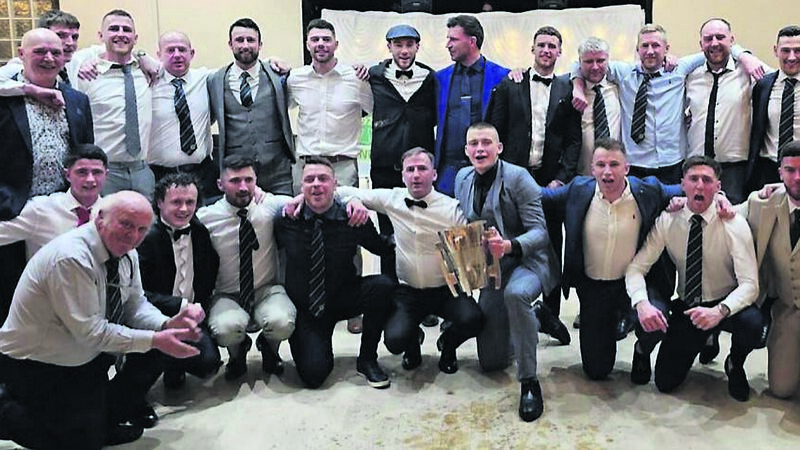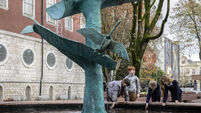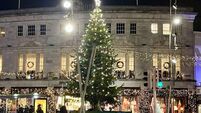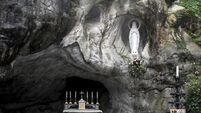My night with GAA exiles who are kings of Kilburn High Road

Set in London in the 1990s, the play is all about six young Irishmen who emigrated to London in the 1970s. They work as labourers, digging drains and constructing roads and houses.
Their initial plan was to work hard, save up a share of money, and come home to Ireland. Unfortunately, things didn’t work out as planned. One of the six did very well setting up his own successful company. The other five worked hard - too hard, and drank hard, and 25 years after their arrival they are broken, beaten men.
One of the group dies and the play is set when they gather in a pub for a wake for their friend. Are they ‘Kings’ of Kilburn High Road or the exact opposite?
The play deals with the issues and problems that were the lot of so many Irish men who went ‘over’ with a dream that often became a nightmare.
Last Sunday morning, in breezy April sunshine, I walked with Pat, a friend of mine, along that very same Kilburn High Road and thought of men like those in Murphy’s great drama.
I also thought of men who truly could be crowned Kings and Emperors (if we only had those titles in our fair land!) of Kilburn and Camden and Cricklewood, and other spots in London where the Irish gravitated towards down the decades.
Men like Padraig and Willie Pearse and Robert Emmett and Tomas MacCurtain, all gave their lives, their blood for Ireland. Those who have been the backbone, the ‘duchais’, the bedrock and the lifeblood of the GAA in London and in other far-flung places didn’t have to die, but by God they’ve truly given their lives to promote and preserve our native games.
As a long-standing member of the GAA with over half a century, I’ve been involved in many campaigns, projects and developments. In the words of Percy French, ‘I’ve been to a great many places, And wonderful sights I’ve seen’ - yes, truly, I’ve been blessed to see the fantastic growth of the Association in all of its spheres and I have met such brilliant and dedicated people.
In my own parish, county and country, the place the GAA has taken at the heart of communities has never ceased to amaze me, and the men and women who have proudly carried the torch for Gaelic Games have no equals.
I flew into Heathrow Airport on Saturday at 5pm and was back in the air on my way home by Sunday afternoon. It was a short, whistle-stop visit, but what memories I will carry forever from my time in Kilburn.
Of course, I knew a certain amount concerning the GAA in London and the clubs who promote Gaelic Games in a city of 10 million people.
Pat Heffernan, from the Blackrock GAA Club in the Kilfinane parish in Limerick, played hurling at Minor, under 21 and Senior level with Limerick. He was part of that generation of Limerick hurlers in the 1990s that won Munster Senior Championships but lost out to both Offaly and Wexford on All Ireland Final Day.
A teacher in the Patrician Academy in Mallow, Heffo came to train our club senior hurling team over a decade ago and we’ve been friends ever since. Just two weeks ago, he rang me: “John, any chance you’d come over to London to present the lads with their County medals?”
The ‘lads’ Pat referred to were the hurlers of the Brothers Pearse Club and the medals were the London County Senior Huling Championship medals for 2023.
Who would refuse an offer like that!
Pat’s two sons were working in London last summer and joined the Pearse’s, and then Pat himself (he’ll never see 50 again!) went over to do a bit of coaching with the side, transferred to the London Club, and ended up as sub goalie with the team.
It was back in 1920, just four years after the 1916 Rising, that the Brothers Pearse GAA Club was formed and named after Padraig and Willie Pearse - two of those executed in the aftermath of the Easter Rising.
The oldest GAA Club in London, it has a reputation for that sense of ‘band of brothers’ attitude on the playing fields - United We Stand and United We Fall.
They won their first County in the year of 1924. They’ve won Senior Hurling titles in every decade except the 1980s, winning in their centenary year of 2020 and again last year - the Club has won 12 Senior Hurling titles in total.
The Rea name is synonymous with Limerick hurling and, since the early 1960s, Gerry Rea has been one of the mainstays of the Brothers Pearse Club. He played in defence for the London Senior hurling team for many, many years. In 1972, he marked Ray Cummins in the All-Ireland semi-final in the old Cork athletic Grounds - Cork won well but Gerry held Ray Cummins to just a goal and a point.
A year later, London shocked Galway in the quarter-final. The London side then met the Munster Champions Limerick in Ennis. Gerry was full back for London and who was full forward for Limerick? His brother Ned (Eamonn)!
Brother on brother as Limerick won and went on to capture the MacCarthy Cup.
For more than six decades, Gerry Rea has guided and promoted and lived for the Brothers Pearse Club. He lives across the road from the Mazenod Social Club in Kilburn where we gathered for the celebrations on Saturday night.
In essence, the Rea home is an ‘Open House’ for all and sundry. Brothers Pearse Club offers no financial ‘inducement’ to anyone coming over from Ireland to play hurling - no, you join the Brothers Pearse to hurl, make friends, and enjoy the company of wonderful people. They’ll help getting a job and see after you well. I was in awe speaking to Gerry Rea on Saturday night and his brother Matt - a National Hurling League winner with Limerick, he was over for the function from his home in Doonbeg.
I heard of Club President Tom Milne, from Lorrha, who died just before the County Final in December. The lads told me of Eamonn Murray -in his 90s now, a man who has given a lifetime to his beloved Club in London.
On the 2023 panel, there were men from Limerick, Galway, Fermanagh, Cork, Laois, Tipperary, Donegal and Kilkenny - but all united in the Green jersey of their adopted London club.
Myself and the London GAA President, Kerryman Pat Griffin, presented the Championship medals and other awards. We had a superb meal and a brilliant night - and early morning too!
Clubs like Brothers Pearse in London have no underage sections and their adult players are a transient group. In the past, many young Irish went ‘over’ for life, whereas nowadays short-term contracts and no shortage of jobs at home mean the numbers available to London clubs are smaller. Yet they keep going.
I thought it must be difficult, but after my experience last Saturday, I can now understand what make these clubs like ‘home away from home’ for so many. Fair play to ye all, truly ye deserve to be called the Irish Kings of the Kilburn High Road.







 App?
App?




